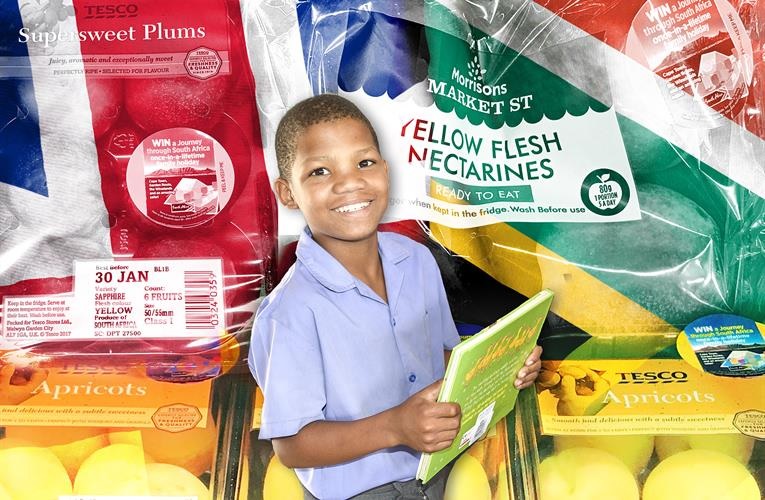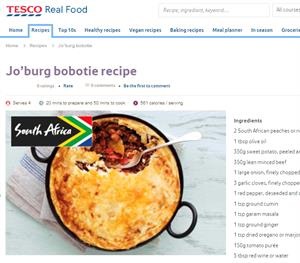Beautiful partnership: South Africa pledges to remain relevant to U.K. market

From Produce Business UK
Over the past decade, significant new markets have opened up to South African fruit. Nonetheless, arrivals to the U.K. have continued to increase thanks to a long-standing relationship and South Africa’s efforts to satisfy U.K. demand. With South Africa’s Beautiful Country, Beautiful Fruit promotional campaign celebrating its 10-year anniversary in the U.K. this year,PBUK speaks with the stakeholders involved to look back at the milestones achieved and forward to what comes next.
“As a percentage of South African fruit exports, the U.K. has decreased as we have moved into and expanded into other markets,” points out Jacques du Preez, the general manager of trade & markets for South African deciduous fruit industry organisation Hortgro, explaining that Asia, the Middle East and Africa comprise the major new export destinations. 
“However, our overall business has grown, and our U.K. business has, too. When total exports are considered, South African volumes have increased by 31% to the U.K. over the past 10 years.”
Those volumes include considerable gains within the stone fruit trade. Between the 2007-08 and 2016-17 seasons, exports to the UK of South African plums rose by 14% to 3.04 million 5.25kg-equivalent cartons; nectarine sendings soared by 106% to 2.33 million 2.5kg-equivalent cartons; and peaches rocketed by 139% to 763,238 2.5kg-equivalent cartons.
Conversely, apricots contracted by 13% to 195,089 4.75kg-equivalent cartons, according to Hortgro data.
“The trading relationship between the U.K. and South Africa goes back many years, and the country remains one of our strongest and most loyal markets,” du Preez adds.
“For this reason, and, with support from our market development campaign [Beautiful Country, Beautiful Fruit] and the U.K. supply chain, we have achieved significant volume growth, particularly in stone fruit over the last decade.”
Enduring promise to innovate
That commitment will endure in the years to come, Du Preez affirms, as the South African trade remains focused on delivering the “most delicious” fruit varieties to U.K. consumers through continued innovation.

A recipe promotion for South Africa's Beautiful Country, Beautiful Fruit campaign on Tesco's website.
In particular, he reveals that research and development work is ongoing in many areas, including efforts to raise the eating quality of Forelle pears, to develop new varieties and to extend the stone fruit season.
“Our recent research in the U.K. and German markets shows that great-tasting fruit remains consumers’ No. 1 motivation for purchasing,” he notes.
“In plums, great eating varieties such as African Delight have helped extend the season further into and beyond April. Now, the main focus of the R&D work for Forelle pears is how to get the best-eating, ripe fruit as possible.
“The U.K. will always be an important market for South African growers, and the South African industry will continue to work closely with retailers, importers and other stakeholders in the supply chain to ensure our fruit remains prominent to the trade and consumers alike.”
Indeed, through innovation South Africa already has overhauled its stone fruit varietal offer for the U.K. as part of its goal to become the world’s preferred supplier of fresh fruit. Over the past decade, the industry has phased out certain less-preferred varieties in favour of better-tasting alternatives.
Examples include the increase in newer varieties of South African plums, such as African Delight, African Rose, Fortune, Purple Majesty and Flavour Fall. Meanwhile, Laetitia volumes have decreased, along with Sapphire, Songold, Pioneer and Souvenir. According to Hortgro, there has also been a shift towards red and black plums.
In the nectarine category, exports to the U.K. of the August Red variety have shot up by a massive 274% in the past 10 years, Hortgro claims, with Super Star also having made gains since its introduction over the past three seasons.
Alpine remains the main exported nectarine variety to the UK, while Margaret’s Pride and May Glo have both been shipped less every season, falling by 79% and 93%, respectively since 2006-07.
As for peaches, varieties that have been delisted over time include Transvalia and Novadonna, with the introduction over the past four to five seasons of Ambercrest, Temptation and Brittany Lane.
In comparison, over the past decade there have been no major increases nor decreases in South African apricot varieties sent to the U.K. Instead, Imperial/Palsteyn is still the preferred variety, along with Charisma, which has made a steady increase over time.
A decade of successful promotions
U.K. consumer acceptance of these varietal improvements and the subsequent sustained expansion of South African stone fruit exports to the U.K. has been driven by Hortgro’s successful Beautiful Country, Beautiful Fruit promotional campaign.
Launched in 2009 as a pilot programme to develop the U.K. market for South African plums, the resulting sales growth and positive reception among the retailers and supply chain led to the inclusion of South African peaches, nectarines, apples and pears the following year.
The current 2017/2018 season marks the tenth edition of this initiative, making Beautiful Country, Beautiful Fruit the longest-running, non-U.K. country of origin campaign in the U.K. at present, according to Dominic Weaver, the managing director of U.S.-based RED Communications, which works alongside Hortgro to coordinate the marketing activities.
Its success largely comes down to Hortgro’s inclusive approach to the U.K. market, states Weaver. “Hortgro visits the retailers and importers to discuss activities at the beginning of the stone fruit and top fruit seasons, involving them and the supply chain in tailoring the retail campaign to suit each supermarket,” he explains.
“Also, we have worked with journalists and food bloggers from the start, highlighting the taste of South African fruit, the ethical reasons for buying it and seasonal uses for the fruit – stone fruit in winter puddings, for example, and apples and pears in summer salads.”
The campaign is further supported by generic initiatives that have galvanised support from across the industry and beyond. Those include the Help a South African School competition and book donation initiative, which is entering its seventh year, and the South African Young Chef of the Yearcompetition, now in its fifth year.
Operating the programme as such across a number of U.K. market channels has contributed further to the campaign’s success and longevity, adds du Preez.
“Creating advocates for South African fruit in multiple areas is powerful and adds to the overall weight of the campaign,” he says.
“We operate across sectors; with activity in retailers and on their shopper websites; in the media; within the catering sector; and on social media.
“In the four years since we launched the first young chefs’ competition, we have seen our four winners travel to South Africa and return with experience of South African food and knowledge of South African fruit.”
In short, du Preez says reaching the 10th year of the initiative represents a huge milestone for South Africa. “It’s vindication for the growers who decided to start developing the U.K. market a decade ago,” he reflects.
This season
As for the 2017-18 season, Weaver says the marketing of the Beautiful Country, Beautiful Fruit campaign has undergone some modifications.
“The imagery has been updated, there will be a new South Africa-focused promotion on both stone fruit and top fruit packs to win a holiday, and there will be an increasing focus on social media activity, with additional content such as 30-second South African recipe videos,” he reveals.
“The Young South African Chef of the Year competition will also be running, and the winning chef will travel to Cape Town to train with chef Luke Dale-Roberts at renowned restaurant The Test Kitchen.”
Supply-wise, du Preez adds that it has been one of the “most challenging” seasons in a “very long” time, meaning crop shortfalls are a reality.
“We are battling the third year of drought in the Western Cape,” he comments.
“Growers, however, have proven themselves to be resilient; implementing technologies and production practises to mitigate the effect of the drought as best possible. The impact varies vastly between regions and within regions, but it’s definitely one of the toughest seasons.”
In addition to the drought, du Preez explains that there has been some hail, sleet, wind and sunburn damage, leading to lower-than-anticipated pack-outs.
Despite this, by the end of the season Hortgro expects South Africa’s total exports of apricots will have declined only by 7%, peaches by 5% and plums by 13%, while nectarines will be up by 4%, compared with 2016-17.
“The blow of the drought has somewhat been softened by new orchards coming into production,” du Preez remarks.















































